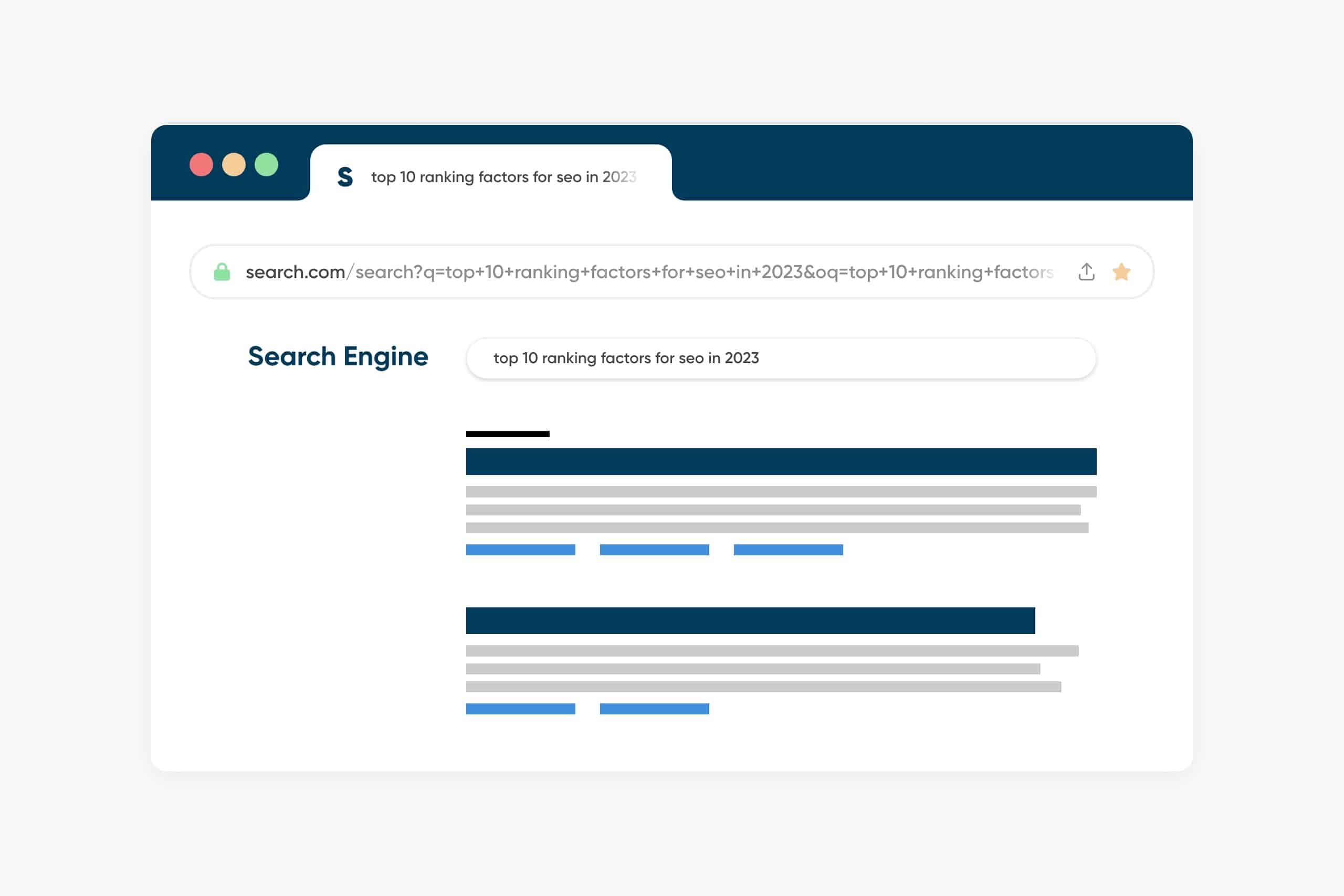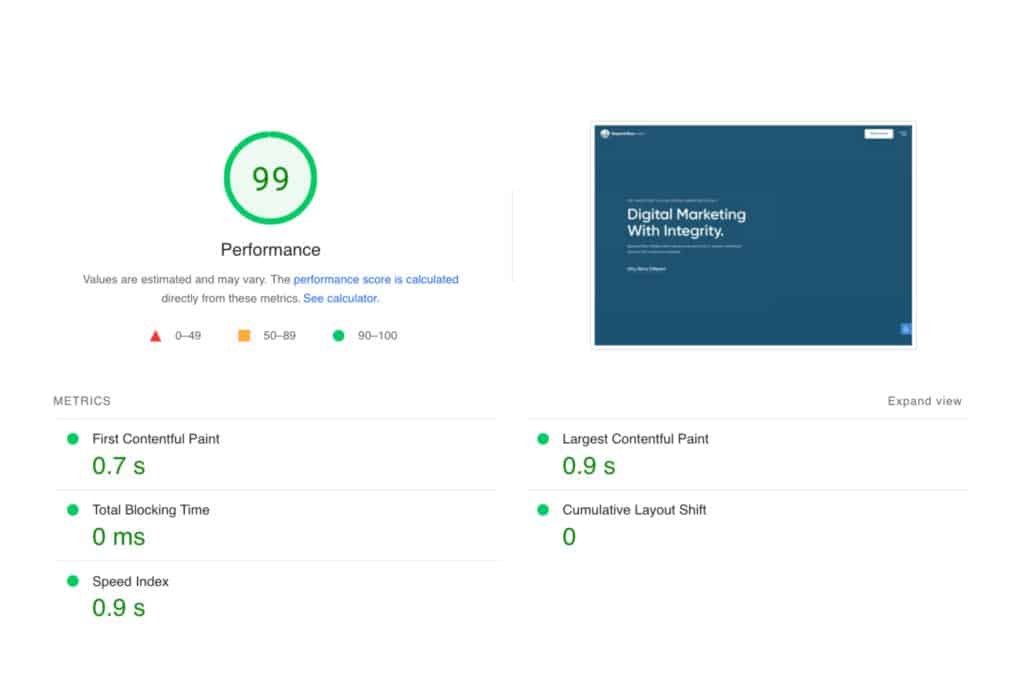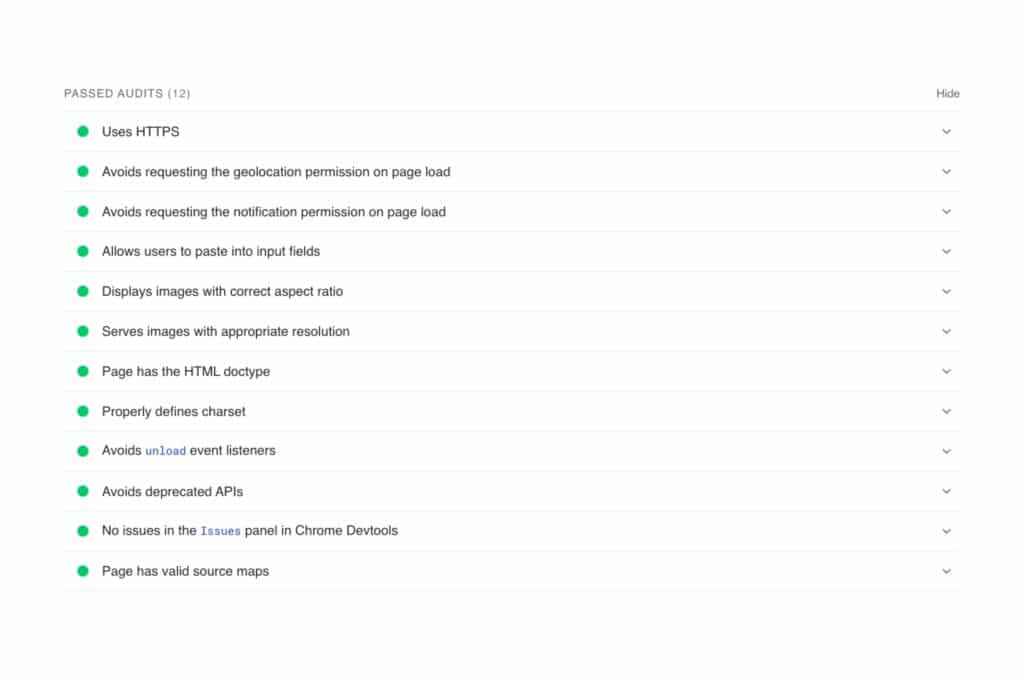
It's already 2023 (wow, I feel old), and let's face it: the evolution of technology certainly isn't slowing down. Search Engine Optimization, or SEO, is one of those areas that just keeps evolving, leaving many novices and semi-pros in the dust. It can feel discouraging after spending months learning the ins and outs of SEO best practices only for, cough cough, a major player in the search engine world to change all the rules randomly.
But don't let that concept force you into a perpetual state of sitting in your sweats, eating ice cream watching Friends reruns. Instead, embrace the changes like Jack embraced Rose on the bow of the Titanic. After all, change is the only constant (emo, I know), and some changes can actually be positive. So, let's dive into today's topic, covering the top 10 ranking factors for SEO in 2023.
What is SEO?
SEO stands for Search Engine Optimization. It is the practice of increasing the quantity and quality of traffic to your website through organic search engine results. This is achieved by optimizing your website's content and design to make it more attractive to search engines, thereby improving its ranking on search engine results pages.
SEO techniques can include using relevant keywords, creating high-quality content, ensuring fast load speeds, and making the website easy to navigate. The goal of SEO is to make your site more visible to people who are looking for information or services that your website provides.
Why is SEO Everchanging?
SEO is ever-changing due to regular updates and changes in search engine algorithms, especially Google’s, which is used for the majority of searches globally. These algorithms are tweaked to provide users with the most relevant and high-quality results. The pace of technological advancement also contributes to the changes in SEO strategies as search engines become more sophisticated in understanding and processing information.
Trends, user behavior, and preferences also change over time, influencing the adjustments needed in SEO. As competition grows on the web, businesses and websites need to adapt and enhance their SEO strategies to remain visible and relevant. If SEO practices did not evolve with these changes, the results would become less useful for the users over time.
Understanding SERPs
A SERP, or Search Engine Results Page, in SEO, refers to the page that a search engine returns with the results of its search. The most common example of a SERP is the page that displays after you perform a search on Google, Bing, or other search engines. The results on a SERP can include organic search results, paid Google AdWords adverts, Product Listing Ads, videos, or an answer box. The aim of SEO is to improve a website's visibility and ranking on the SERP.
How do Changing Algorithms Affect SERPs Rankings?
Google’s changing algorithms affect SERPs rankings by determining how websites are analyzed and ranked. These changes influence what factors are prioritized when ranking pages. For instance, updates may emphasize mobile-friendly sites, site speed, or quality of content. The algorithms also combat manipulative tactics, like keyword stuffing or link schemes, used to gain higher SERP rankings.
Websites that don't adapt to the new updates may experience a drop in rankings, while those that align with the changes could see improved rankings. Hence, the continuous evolution of Google's algorithms keeps shaping how pages appear on SERPs.
Top 10 Ranking Factors for SEO in 2023
While there are over 200 different ranking factors in SEO (that we know of), these 10 are by far the most influential in our experience:
1. Mobile-Friendliness

Mobile-friendliness in 2023 is an absolutely critical component of any SEO strategy. As we've seen in preceding years, search engine algorithms are placing more and more emphasis on how well a website performs on mobile devices.
Here are several reasons why mobile-friendliness is crucial as a ranking factor for SEO:
- Increasing Mobile Usage: More people are accessing the internet through mobile devices than ever before. According to Datareportal, in 2022, around 65% of the world's population is using mobile phones, and this figure is only expected to increase in 2023. If a site isn't mobile-friendly, it's likely to offer a poor user experience to a large percentage of its potential audience, which can impact its SEO rankings negatively.
- Google's Mobile-First Indexing: In March 2021, Google switched entirely to mobile-first indexing, meaning it predominantly uses a website’s mobile version for indexing and ranking. If your website isn't optimized for mobile, it could miss out on potential ranking opportunities.
- User Experience (UX): Mobile optimization isn't just about making your site accessible to mobile users — it's also about providing a positive user experience. Slow loading times, difficult navigation, and illegible text can all lead to high bounce rates, harming your SEO ranking.
- Local SEO: For businesses targeting local audiences, mobile SEO is particularly important. Many users use their mobile devices to find local businesses while they are on the go. Optimizing for local search terms and using features like Google My Business can help improve visibility in local search results.
- Higher Engagement Rates: Mobile users tend to engage more with the content. Be it clicking on an ad, making an online purchase, or spending more time on a page, mobile users tend to display higher engagement rates. Hence, mobile-friendly sites tend to receive better engagement, which in turn positively affects SEO.
- Social Media Traffic: Most social media activities happen on mobile devices. If your content is shared on social media, it's likely to be viewed on a mobile device. Hence, having a mobile-friendly website can also improve your social media referral traffic.
It's more crucial than ever to ensure that your website is mobile-friendly. By doing so, you can provide a better user experience, improve your SEO rankings, and potentially drive more traffic and conversions.
2. Page Speed

Page speed, also known as website loading time, is a crucial element for SEO in 2023 and affects how search engines rank a website. There are a few reasons why page speed is so critical.
- User Experience (UX): One of the primary reasons why page speed matters is because of user experience. Online users prefer websites that load quickly, and they're likely to depart from a site if it takes too long to load. The immediate impression that users get from a fast-loading site improves the overall UX, which indirectly impacts SEO. Moreover, if the site loads quickly, people are more likely to stay longer, view more pages, and engage more, which would improve your website's bounce rate — beneficial for SEO.
- Conversion Rates: Speedy websites keep visitors happy and can lead to higher conversion rates. If your site's pages load swiftly, it's more likely to hold visitors' attention, heightening the chances of them responding to the call to action (like signing up for a newsletter, making a purchase, etc.) positively.
- Search Engine Rankings: Page speed is one of the parameters that search engines like Google consider when ranking websites. Google has flagged page speed as a ranking factor since 2010 for desktop searches and since 2018 for mobile. A faster page speed means a better ranking on the search engine result page (SERP), leading to more visibility and potentially more organic traffic to your site.
- Mobile User Experience: With the rise of mobile internet usage, optimizing page speed for mobile devices has become even more critical. Google introduced mobile-first indexing in 2019, meaning it primarily uses a website's mobile version for ranking and indexing. Given that mobile users often have slower internet connections than desktop users, they're even less tolerant of slow-loading websites.
- Competitive Edge: If two websites' content quality is equal, the website's speed could be the deciding factor on which ranks higher. Therefore, a better-performing (faster) website can gain a competitive advantage over slower sites in search engine rankings.
Page speed is a significant factor for SEO in 2023, largely as it's a direct ranking factor, and it’s also important for improving user experience and conversion rates. However, while focusing on speed, ensure not to compromise the quality of content and the usefulness of your website. As ever, these remain critically important for SEO.
3. Focused, Quality Content (E-E-A-T)

In 2023, focused, quality content remains an undeniable pillar in SEO strategies. Google's E-E-A-T (Experience, Expertise, Authoritativeness, and Trustworthiness) guidelines continue dictating their ranking factors more than ever. Therefore, digital marketers must place a premium on crafting high levels of quality content tailored to meet these gilded criteria.
- Experience: This is the newest addition to the once easy-to-digest (pun intended) E-A-T acronym; Experience refers to the ideology that a content writer should have first-hand experience or knowledge pertaining to a specific topic. This is not always possible, and it's unclear how Google can determine this as true or false for each page, but it is a strong rule of thumb to only write about what you know.
- Expertise: Google prioritizes websites with a high degree of knowledge in their respective fields. The content should manifest technical precision, comprehensive insight, and a thought-leadership perspective to differentiate itself from competitors.
- Authoritativeness: Content must demonstrate authority, meaning it should be displayed on a credible platform and penned by known experts in the field. Features like author bios, credible backlinks, and positive user interactions can contribute to this factor.
- Trustworthiness: Trust is essential in cultivating a reliable online presence. Secure sites (HTTPS), accessible contact information, clear website policies (like privacy and terms of service), and consistent positive user reviews signal to Google that your site can be trusted.
Google's search algorithms have evolved to reward content that shows its E-E-A-T. They're no longer just looking for keyword-heavy articles; they want to provide their users with the most reliable, helpful, and relevant content possible, not just those with a keyword density of 5 per 100 words (don't do that!).
In this regard, understanding and building content within the E-E-A-T guidelines is, therefore, crucial for SEO ranking in 2023. This approach encourages businesses to create content intentionally, ensuring every piece is crafted with a focused agenda that aligns with their area of expertise, written by credible voices, and designed with user trust in mind. This way, websites reap two major benefits—an improved SEO ranking and a loyal base of readers that appreciate and trust what they read.
Focused, quality content remains inherently significant within SEO strategies in 2023. Commanding a comprehensive understanding of Google's E-E-A-T guidelines allows marketers to craft superior, relevant, and valuable content that enhances visibility, credibility, and, eventually, conversions.
Remember that quality content doesn't just mean pumping out entertaining information about anything. Make sure what you publish is relevant to your particular niche. If you run a sustainable and forward-thinking online bookstore, it would be bad to post about the best drills to use in an oil rigging company. Instead, talk about your business practice; in the case of our bookstore scenario, "10 Books That Will Make You Love Reading" would be a better market fit.
4. SSL/HTTPS Encryption

SSL (Secure Sockets Layer) and HTTPS (Hyper Text Transfer Protocol Secure) encryption have become crucial components of Search Engine Optimization (SEO) in recent years. They are expected to remain noticeably important in 2023 and beyond.
In 2014, Google launched an initiative to make the internet safer by encouraging all websites to move from HTTP to HTTPS. To encourage this migration, Google made HTTPS a lightweight ranking factor, meaning that the search engine gives preference to websites that are secured with an SSL certificate.
SSL and HTTPS encryption serve several key functions that contribute to SEO:
- User Trust: Firstly, SSL and HTTPS encryption ensures that all data passed between a website and its users remains confidential and secure. This assures visitors that their personal data (passwords, credit card information) is protected, thereby increasing user trust, resulting in reduced bounce rates, increased user engagement, and improved rankings in search results.
- Data Integrity: Without SSL encryption, the data transferred between the user's browser and the web server could be vulnerable to interception and alteration. This compromises the integrity and reliability of the data, which is undesirable both for the user and search engine ranking.
- Authentication: SSL certificates assure users that they are communicating with the right server and not a fraud or imposter, thus ensuring the authenticity of your site.
- Improved Rankings: Given that Google prefers HTTPS sites, having SSL encryption can improve the ranking of a site in search results, albeit it is a lightweight ranking factor.
- HTTPS as a Norm: Today, having HTTPS encryption has become the norm rather than the exception. With browsers like Chrome clearly marking HTTP sites as 'Not Secure', not having SSL could end up deterring visitors and decreasing site engagement – factors that would indirectly impact the SEO ranking of the site.
Therefore, the significance of SSL/HTTPS encryption is twofold – it directly affects site ranking due to the preference given by search algorithms and, indirectly, by increasing user trust and engagement, which also feeds into SEO metrics. It is, therefore, likely that in 2023, the importance of SSL/HTTPS encryption in SEO will remain as key as ever.
5. Core Web Vitals

Core Web Vitals are becoming increasingly crucial for SEO rankings as we move into 2023, influencing not just the performance of a website but also how Google perceives it. They are a collection of specific factors that Google considers important in a webpage's overall user experience.
- Improved User Experience (UX): Aspects like loading time (Largest Contentful Paint, LCP), interactivity (First Input Delay, FID), and visual stability (Cumulative Layout Shift, CLS) all play a significant role in the experience of a user. Fast, smooth, visually stable pages are more likely to engage users, encouraging them to stay longer and interact more meaningfully with the content.
- Officially-Recognized Google Ranking Factor: This means websites with poor core vitals scores can potentially lose visibility and ranking on search engine result pages (SERPs). In contrast, those with optimized scores can be favored more and climb higher on search pages.
- Mobile-First Core Vitals: With the rise of the mobile-first index, where Google predominantly uses the mobile version of the content for indexing and ranking, optimizing Core Web Vitals is even more important because most users are likely to access websites via their mobile devices.
- Lower Bounce Rates: When your website offers a better user experience, visitors are less likely to 'bounce' away due to slow loading times or poor navigability. This can indirectly enhance your SEO, as Google may consider bounce rate as a ranking factor.
The importance of Core Web Vitals as a ranking factor for SEO cannot be understated. It is necessary to regularly measure and optimize these components to maintain or improve search engine ranks, provide stellar user experiences, and inevitably enhance the overall performance of websites.
6. User Experience (UX)

User experience (UX) continues to play an increasingly significant role as a ranking factor in Search Engine Optimization (SEO) in 2023. User experience covers a broad set of aspects, including site loading speed, interactivity, stability, intuitiveness, mobile-friendliness, ease of navigation, and website security. Here's why UX is now one of the fundamental parts of modern SEO:
- Core Web Vitals: Google's introduction of Core Web Vitals as a ranking factor in 2021 marked a significant shift towards prioritizing user experience in SEO. These metrics, such as Largest Contentful Paint (LCP), Cumulative Layout Shift (CLS), and First Input Delay (FID), are direct measures of load time, visual stability, and interactivity, respectively. In 2023, these measures continue to be critical, and websites must constantly keep these scores above the threshold to maintain their ranking.
- Mobile-first Indexing: Since the launch of mobile-first indexing, the mobile version of a site has become extremely important. Google ranks the mobile version of a site, emphasizing the significance of mobile optimization in user experience for SEO.
- Increased User Expectations: As internet technology evolves, user expectations increase. What was considered good UX a few years ago may not be acceptable now. Users now value personalized, high-quality experiences, fast page speeds, streamlined navigation, and secure websites. A site that fails in these areas will see higher bounce rates, which can impact SEO ranking.
- Semantic Search: Google's algorithm has become more sophisticated in understanding the context and intent behind search queries. A site's content needs to be valuable, relevant, and easy to understand. A good UX, which includes aspects like readable content and easy navigation, helps meet these requirements.
- BERT and AI Integration: Google's integration of AI and machine learning with SEO, like the BERT algorithm, understand natural language more accurately. Websites providing a high-quality UX with natural, conversational language will likely rank better.
- Backlink Profile: A good UX can generate more shares and links to your website because users appreciate a well-structured, user-friendly site. This can indirectly improve your SEO by boosting your backlink profile.
In conclusion, focusing on user experience is no longer optional from an SEO perspective. It has permeated all aspects of SEO strategy, from site structure and content creation to technical optimization. As Google continues to refine its algorithms to serve users better, the importance of UX in SEO is only set to increase further in 2023 and beyond.
7. Backlinks

Backlinks continue to be one of the dominant SEO ranking factors in 2023, reinforcing websites' credibility, popularity, and growth in traffic. Though many changes have evolved in SEO strategies, the importance of backlinks remains steadfast, as they are a key means to measure a page's overall relevance and authority.
- Trust and Credibility: Backlinks are effectively an endorsement from one website to another. They signal to search engines that the content is informative, reliable, and hence, worth linking to. The more high-quality backlinks a page has, the more trusted and credible it is deemed, boosting its position in search engine rankings.
- Referral Traffic: Quality backlinks not only affect search engine rankings, but they also attract referral traffic. This traffic comes directly from users clicking on the links, contributing to a historical trail that can positively impact site ranking.
- PageRank Algorithm: Google's PageRank algorithm fundamentally operates off backlink assessment. A higher number of quality backlinks improves PageRank and consequently positions a page favorably on search engine results. In 2023 and beyond, this is still an integral part of Google's ranking algorithm.
- Visibility and Indexing: Backlinks help in faster indexing of the site. They assist search engine bots in discovering and navigating your website, improving your site's visibility in organic search results.
- Competitor Advantage: A comprehensive backlink profile can provide a competitive edge in SERPs. Without sustained backlink-building efforts, a website might lose out to competitors who are leveraging link-building for a better search appearance.
- Measures Content Quality: Backlinks serve as indicators of content quality. Websites generally link back to content that is valuable to their audience. Thus, more backlinks often equals more quality content, which is a strong ranking signal.
- Website Authority: Websites with a high number of quality backlinks are considered high-authority sites by Google. These websites usually show up earlier in search engine results.
Hence, in 2023, businesses and marketers should invest resources and efforts in developing strategies for creating high-quality, organic backlinks to improve their SEO ranking and website authority. Factors such as the relevance and the credibility of the linking sites, the anchor text used, and the overall link profile can make a difference to your backlink strategy's effectiveness.
8. Domain Authority

Domain authority (DA) continues to be a paramount factor in Search Engine Optimization (SEO) in 2023. It is not only a key element for gauging a website's performance but also plays a critical role in determining a website's search engine ranking.
- Predicts Ranking: DA gives website owners, marketers, and SEO specialists a glimpse into their site's potential performance on search engine results pages (SERPs). It uses a unique algorithm that combines various link metrics, such as linking root domains and the number of total links, to predict how well a website will rank on SERPs.
- Measures Trustworthiness: A high domain authority suggests that a website is trustworthy, reliable, and has a good reputation. This credibility is an important factor that search engines consider when ranking websites. Trustworthy sites are more likely to rank higher on SERPs.
- Helps to Outrank Competitors: In a highly competitive environment, maintaining a higher DA than your competitors can give you an advantage. Websites with higher domain authority tend to rank higher than those with lower domain authority. Thus, knowing and improving your DA could mean outranking your competitors.
- Influences Link-Building Strategy: Backlinks are an important part of SEO, and DA can influence the potential value of a backlink. Websites with high domain authority are more likely to pass on more link equity, which can have a positive impact on your site's own DA and ranking.
- Provides Benchmark for Improvement: Tracking DA over time can provide crucial insights into the effectiveness of your SEO strategies, helping you identify what works and what doesn't and adjust your tactics accordingly.
However, it's important to note that domain authority is not the only ranking factor. Other factors such as user experience, mobile-friendliness, page speed, content relevancy, and a myriad of other factors also contribute significantly to your site's ranking. Domain authority should, therefore, be seen as part of a larger collection of metrics that influence SERP rankings.
Ultimately, DA remains a predictive, comparative tool more than anything else and should be used alongside other metrics and in the context of an overall strategic SEO plan in 2023.
9. Schema Markup

Schema markup continues to be an impactful ranking factor for SEO in 2023, playing an integral role in improving the visibility of a website in search engine results.
Schema markup provides search engines with more informative results for users. It's a powerful SEO tool that helps search engines understand the context and content of your website, thus greatly impacting its performance in organic search results.
The significant role of schema markup for SEO revolves around the concept of context and clarity. By leveraging structured data, websites can give search engines explicit clues about the meaning of a page. It aids in better categorizing and indexing the web page, thereby leading to improved ranking and visibility.
Featured snippets have become increasingly popular, and websites that use schema markup often have an edge to feature in these snippets. It further increases click-through rates and brings more traffic.
Also, with an ever-increasing reliance on voice search and AI technology, schema markup becomes more significant for SEO. Search engines like Google and Bing are investing in delivering more personalized and relevant results to users. Schema markup supports the communication of more specific information, which can be vital in optimizing voice search and mobile search.
The emergence of AI and machine learning algorithms in search engines also highlights the importance of schema markup. It helps these sophisticated algorithms understand the website content and its context better, thereby improving the site's representation in SERPs.
Schema markup in 2023 has become an indispensable SEO element that can boost website ranking, enhance SERP visibility, improve CTR, and play a strategic role in capitalizing on the possibilities presented by voice search and AI technology.
10. Social Signals

Social signals have been recognized as an influential factor in SEO ranking, and by the year 2024, their importance is predicted to increase even further. While the direct impact of social signals on SEO ranking is a topic of ongoing debate, their indirect impact cannot be overlooked. Those skeptical about a direct correlation should consider the importance of user experience and engagement, two key areas where social signals play a pivotal role.
Social signals such as likes, shares, comments, votes, pins, views, etc., produced on social media platforms like Facebook, Twitter, Instagram, and Pinterest, represent the human interactive element in the realm of SEO. They provide a measure of a brand's interaction levels with visitors on social media platforms.
- Brand Visibility and Recognition: A higher number of social interactions leads to increased visibility and recognition of the brand or website. This indirectly boosts your SEO ranking because Google considers brand signals as an important ranking factor. The logic behind this is simple; the more a brand is mentioned, the more important it must be.
- Quality Content Distribution: Social signals indicate quality content. When users share content, it means they found it useful or engaging. Quality content is greatly rewarded by search engines, especially Google, since it is focused on enhancing user experience.
- Increased Website Traffic: Social signals also lead to more traffic to your site. The more shares your posts and blogs receive, the more visible they become. This, in turn, drives more people to your site, another important factor that search engines consider for ranking purposes.
- Building Trust and Credibility: A brand that maintains active social media profiles and regularly participates in dialogues with its customers is seen as more trustworthy. This trust converts into credibility, another search engine's ranking factor for SEO.
- Backlinks: Social signals can also help your content gain more backlinks. When you create content that is shared and liked extensively, it will naturally attract backlinks. Backlinks remain one of the strongest ranking signals for search engines.
By 2024, search engines are predicted to be even more focused on providing the best user experiences, further incorporating human factors into their algorithms. Social signals will inevitably increase in importance as an integral part of a brand's SEO strategy. Implementation and consistent management of a robust social media strategy would, therefore, be highly recommended in the lead-up to 2024.
Tools to Monitor Your SEO Progress
- Google Analytics: This is arguably the most crucial tool for tracking SEO progress. It allows you to monitor all the essential aspects of website traffic, visitors’ behavior, traffic sources, conversions, and more.
- SEMRush: This tool allows you to analyze your website and look at its performance in terms of SEO. You can also take a glimpse at your competitors to see what they are doing and understand their SEO strategies.
- MOZ: The suite of tools offered by MOZ allows you to track your site’s search ranking and link-building progress. You can also find valuable keyword suggestions, perform site audits, and much more.
- Ahrefs: Another fantastic tool for link building and keyword research. Ahrefs also give you the ability to check on your competition, track your ranking, and audit your website.
- Google Search Console: This tool helps you identify any crawling errors on your website, submit a sitemap, and see the types of queries people use to find your website.
- SERanking: This tool provides extensive data for keyword position tracking, competitive analysis, and website audits.
- Screaming Frog: It is an SEO Spider tool that provides a great deal of information about your site, like duplicate content, broken links, and more, to help you optimize your website.
- Majestic SEO: This tool provides you with information regarding your website backlinks and helps you find the best places to build more links.
- KWFinder: This tool helps you find long-tail keywords that have lesser competition. The tool provides a difficulty score for keywords to help you understand which ones you should target.
- Rank Math: If you have a WordPress website, then Rank Math can be very beneficial. It helps optimize your meta tags and content, generate sitemaps, and so much more.
Remember, utilizing these tools isn't a one-time thing. Regular monitoring and auditing are key to ensuring your website remains optimized and your SEO strategies work effectively.
The Bottom Line
In conclusion, the evolution of SEO continues in 2023, requiring constant adaptation and flexibility from businesses and digital marketers. Key factors influencing SEO this year range from mobile-friendliness and page speed to content quality, domain authority, UX, and backlink strategies.
Technological advancements, specifically around AI and voice search, also shape trends in SEO, emphasizing the need for adaptability and future-proofing. Furthermore, social signals are gaining traction as an influential factor for SEO ranking as search engines increasingly value high-quality user experiences.
Regular monitoring and auditing via SEO analytic tools remain crucial for effective SEO strategies. Despite rapid changes, the core principle stays the same: creating high-quality, relevant content for the end user is paramount to SEO success.
For more helpful SEO tips and best practices, check out our blog.


